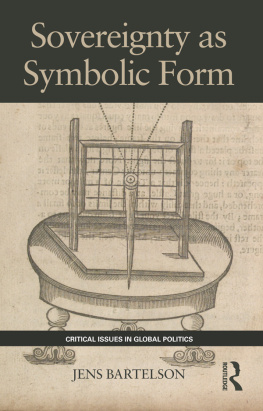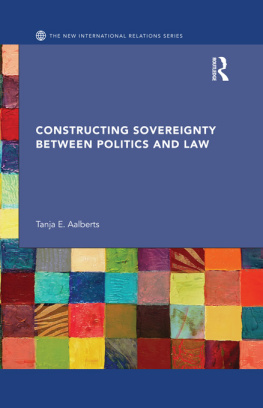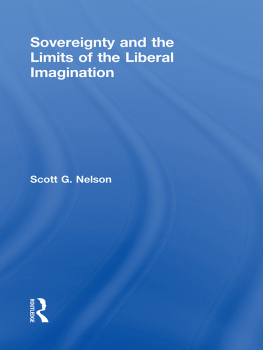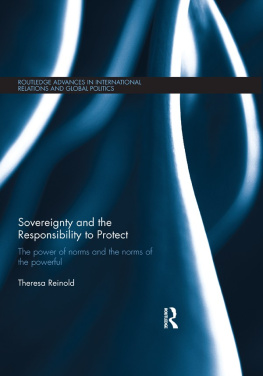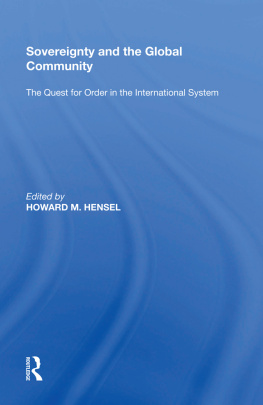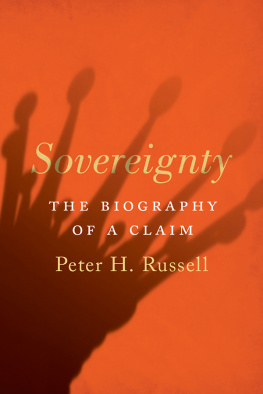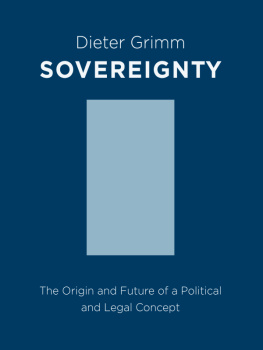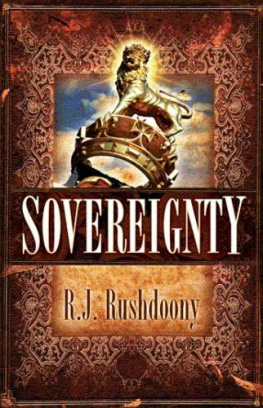Sovereignty as Symbolic Form
This book is a critical inquiry into sovereignty and argues that the meaning and functions performed by this concept have changed significantly during the past decades, with profound implications for the ontological status of the state and the modus operandi of the international system as a whole.
Although we have grown accustomed to regarding sovereignty as a defining characteristic of the modern state and as a constitutive principle of the international system, Sovereignty as Symbolic Form argues that recent changes indicate that sovereignty has been turned into something granted, contingent upon its responsible exercise in accordance with the norms and values of an imagined international community. Hence we need a new understanding of sovereignty in order to clarify the logic of its current usage in theory and practice alike, and its connection to broader concerns of social ontology: what kind of world do we inhabit, and of what kind of entities is this world composed?
This book will be of interest to students of International Relations, Critical Security and International Politics.
Jens Bartelson is Professor of Political Science, Department of Political Science, Lund University, Sweden.
Critical issues in global politics
This series engages with the most significant issues in contemporary global politics. Each text is written by a leading scholar and provides a short, accessible and stimulating overview of the issue for advanced undergraduates and graduate students of international relations and global politics. As well as providing a survey of the field, the books also contain original and groundbreaking thinking which will drive forward debates on these key issues.
1. Global Ethics
Anarchy, freedom and international relations
Mervyn Frost
2. International Statebuilding
The rise of post-Liberal governance
David Chandler
3. Governmentality
Critical encounters
William Walters
4. Re-Envisioning Global Development
A horizontal perspective
Sandra Halperin
5. Sustainability
If its everything, is it nothing?
Heather M. Farley and Zachary A. Smith
6. Sovereignty as Symbolic Form
Jens Bartelson
First edition published 2014
by Routledge
2 Park Square, Milton Park, Abingdon, Oxon OX14 4RN
and by Routledge
711 Third Avenue, New York, NY 10017
Routledge is an imprint of the Taylor & Francis Group, an informa business
2014 Jens Bartelson
The right of Jens Bartelson to be identified as author of this work has been asserted by him in accordance with the Copyright, Designs and Patent Act 1988.
All rights reserved. No part of this book may be reprinted or reproduced or utilised in any form or by any electronic, mechanical, or other means, now known or hereafter invented, including photocopying and recording, or in any information storage or retrieval system, without permission in writing from the publishers.
Trademark notice: Product or corporate names may be trademarks or registered trademarks, and are used only for identification and explanation without intent to infringe.
British Library Cataloguing in Publication Data
A catalogue record for this book is available from the British Library
Library of Congress Cataloging in Publication Data
Bartelson, Jens.
Sovereignty as symbolic form / Jens Bartelson.
pages cm. (Critical issues in global politics ; 6)
Includes bibliographical references and index.
1. Sovereignty. 2. International relations. I. Title.
JC327.B2454 2014
320.15 dc23
2013045402
ISBN: 978-0-415-44682-2 (hbk)
ISBN: 978-0-415-44683-9 (pbk)
ISBN: 978-1-315-77490-9 (ebk)
Typeset in Bembo and Stone Sans
by RefineCatch Limited, Bungay, Suffolk
Contents
This book was originally intended as a brief overview of the academic debate on sovereignty. Gradually it evolved into something different: a critical study in the contemporary theory and practice of sovereignty. In the process of engaging the academic debate, I was struck by its tendency to reiterate existing views and the lack of attention to its own performative aspects. While a dominant theme in this debate has been to demonstrate that sovereignty is what we make of it, many of those authors who marveled at its constructed character failed to note that this means that anything then can be done to sovereignty in the name of preserving sovereignty. I then discovered that findings from research undertaken outside the mainstream of international relations indicated that sovereignty had become an object and instrument of government rather than its precondition, and that the strategies harnessed for this purpose were often legitimized with reference to the mutability and contingency of sovereignty. Those of us who had spent so much intellectual labor deconstructing and historicizing sovereigntysometimes in the vain hope of escaping its hold over our political imaginationhad thereby inadvertently provided the rhetorical resources necessary for its governmentalization and restoration.
I guess that this is what my dear colleague Andreas Behnke meant when he once told me that sovereignty had run away from me. Indeed, it had, and this book is an attempt to catch up. This makes it imperative to confront an issue that I had dodged in my previous work: the ontological status of sovereignty. As the title of this book indicates, I think that sovereignty is best understood as a symbolic form. The obvious source of inspiration in this regard is Erwin Panofskys seminal study in the history of art, Perspective as Symbolic Form , first published in 1927.
Notes
Erwin Panofsky, Perspective as Symbolic Form (New York: Zone Books, 1991).
Ernst Cassirer, The Philosophy of Symbolic Forms IIII (New Haven, CT: Yale University Press, 1955).
Many people have been instrumental in the process of writing this book. Tanja Aalberts, Olaf Corry, Dan Edelstein, Harry Gould, Stefano Guzzini, Christian Joppke, Fritz Kratochwil, Ned Lebow, Iver Neumann, Erik Ringmar, Ole Jacob Sending, Johan Tralau, Neil Walker, Rob Walker and Colin Wight have either been kind enough to comment on individual chapters, or have provided me with constructive feedback on my ideas in other ways. Finally, Nick Onuf generously took upon himself to read the entire manuscript, and provided me with truly invaluable comments and suggestions for revision. But my greatest gratitude goes to my wife Mia, who has patiently put up with the intro-version and grumpiness that come with any creative endeavor of mine.
This book is a critical inquiry into the meaning and function of sovereignty in the present day. As I shall argue, the meaning and function performed by this concept have changed significantly over the past few decades, with profound implications for the ontological status of the state and the modus operandi of the international system as a whole. Although we have grown accustomed to regard sovereignty both as a defining characteristic of the modern state and a constitutive principle of the international system, recent changes indicate that sovereignty has been turned into something granted, contingent upon its responsible exercise in accordance with the norms and values of an imagined international community.
But how did we get into this predicament? While I believe that this transition has been brought about by new political practices, I will suggest that it has been greatly facilitated by simultaneous changes in the way we understand political concepts and their meaning. During the past few decades, an essentialist understanding of conceptual meaning has gradually given way to an emphasis on the mutability and contingency of concepts, something which in turn has made it possible to stretch concepts like sovereignty beyond their established connotations and thereby legitimize new political practices. Therefore, I shall argue that the recent changes in the meaning and function of sovereignty cannot be grasped without taking the consequences of this insistence on mutability and contingency into serious consideration. This in turn compels us to address the question of the ontological status of sovereignty, an issue that has been avoided by those who have been busy contextualizing and historicizing sovereignty during the past few decades. Yet we cannot claim to know what the concept of sovereignty means in a given context without thereby implicitly committing ourselves to some view of what sovereignty ultimately is . Taking issues of conceptual meaning to be distinct from issues of ontology represents but another ontological commitment that makes it difficult to understand how such a disavowal of ontology has affected sovereignty in the present. To this end, I will suggest that sovereignty should be understood as a symbolic form by means of which Westerners have perceived and organized the political world since the early-modern period.

